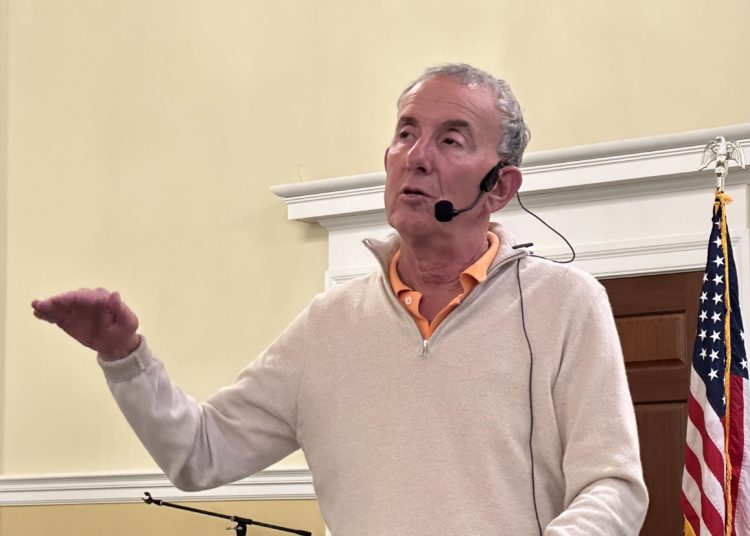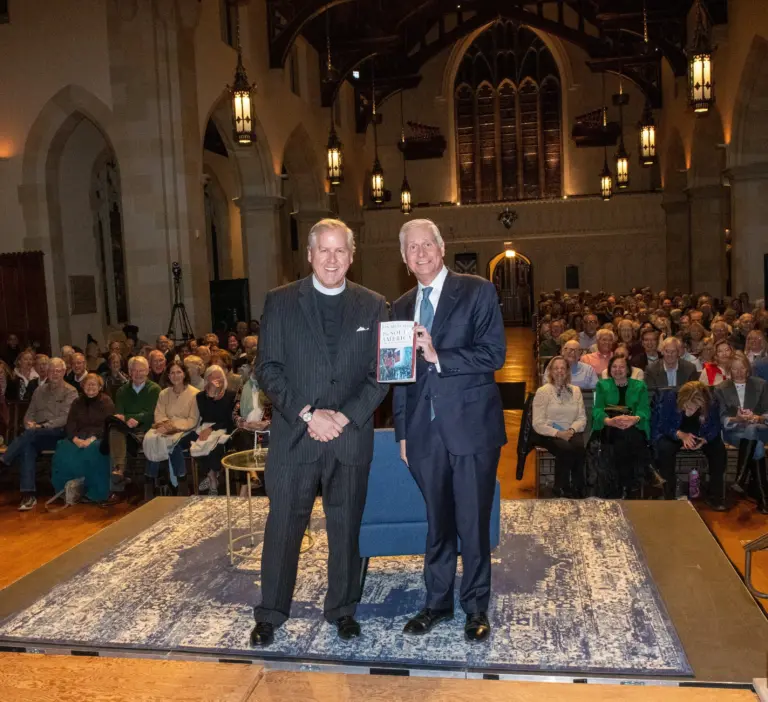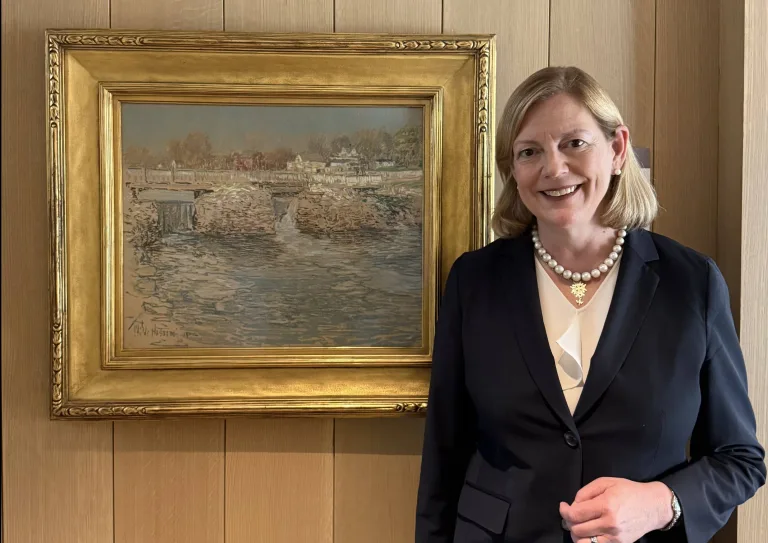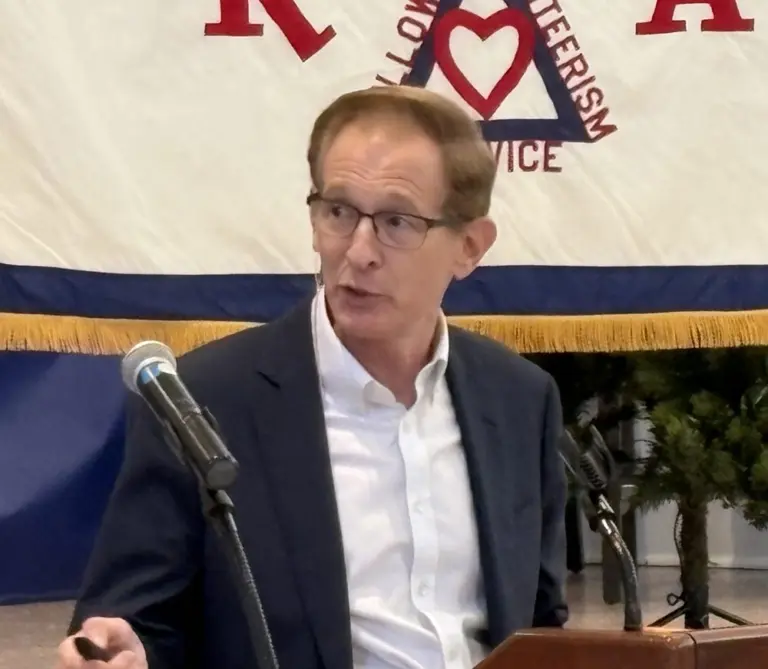
By Arnold Gordon
At the October 23rd meeting of the Retired Men’s Association Spike Lipschutz introduced the day’s speaker, Dr. Edward Schuster. The title of his presentation was “How to Live to Be a 100 Without Disability.” Dr. Schuster is a Stamford based cardiologist who received his medical degree at the Chicago Medical School and completed his internship and residency at Duke Hospital. He was a fellow in cardiology at the Johns Hopkins Hospital, and is currently an attending physician at Stamford Hospital. He is a member of the Board of Directors of the Stamford Hospital Foundation, the director of cardiac rehabilitation, a member of the teaching faculty at Columbia University, and medical director of The Tully Health and Fitness Institute in Stamford. He is married with three children and four grandchildren, and resides in Stamford.
Dr. Schuster began by telling us that he has been giving the same talk for 43 years, with lots of updates along the way, including a title change to refer to reaching 120 years instead of 100. Why? Using ChatGPT, he asked whether God ever said how long man should live. The answer led to Genesis 6.3, in which God said “My spirit shall not abide in man forever, for he is flesh. His day shall be a hundred 20 years.”
Overall, Dr. Schuster’s presentation provided a comprehensive overview of the factors contributing to a long and healthy life, blending personal anecdotes with professional expertise. His message underscored the power of informed lifestyle choices, medical knowledge, and emerging technologies in shaping our health destinies.
In order to put into perspective how we age and for how long, he presented some interesting statistics: the world’s oldest person with proof of her age was a woman in France who died not too long ago at the age of 122 (she was known to smoke and drink). In CT, the average age at death is 78 for men and 80 for women. For the first time in US history, average life expectancy has dropped, largely due to Covid and deaths due to drug overdoses. There are about 150,000 people in the US who have reached 100, even some with existing heart disease. People are staying healthy as they age, but generally, it takes a lot of money (or great insurance) to receive quality medical services and maintain a healthy lifestyle. When we were growing up nobody over 65 was still working, and nobody was playing pickleball at 85. Dr. Schuster noted that when he started practice, the only people who reached a hundred were little old ladies who never saw a doctor because there was nothing wrong with them. Now, an impressive number of patients who have had, e.g., bypass surgery, pacemakers, and stents are making it to 100.
Dr. Schuster’s discussion on longevity was multifaceted, covering genetics, lifestyle choices, and advances in medical technology. He emphasized the importance of understanding one’s family medical history, noting that genetic predispositions play a significant role in health outcomes, which is why it is important to let your doctor know of any family history of serious illness (cancer, diabetes, heart disease, etc.). He discussed the evolution of genetic testing, the decreasing cost of decoding the genome, and the potential for personalized medical interventions based on genetic profiles through the use of the new technique CRISPR.
A major theme was the impact of lifestyle choices on longevity. He underscored the importance of regular exercise, stating it is the only proven method to reduce the risk of Alzheimer’s disease. He also highlighted the dangers of smoking, which can shorten one’s lifespan by a decade. Interestingly, married men live longer than unmarried, but there is no effect for women. Lifestyle and healthcare risk factors that affect longevity include: seat belt use; air pollution; religion (religious people live longer); body weight (40% of Americans are obese, which increases the risk of heart disease, cancer and other diseases); education (more leads to longer life); low bad cholesterol (LDL below 80); very little alcohol; controlled blood pressure; annual mammograms; good dental hygiene; latest flu, Covid and RSV vaccinations.
Diet played a central role in Dr. Schuster’s recommendations, specifically the Mediterranean diet, rich in olive oil, fish, nuts, fruits, and vegetables, which prevents various diseases. He cautioned against consumption of processed foods and fast food, linking them to poor health outcomes. Dr. Schuster also touched upon the potential of certain medications to contribute to longevity. He mentioned Ozempic, a diabetes drug that is also used for weight loss and may have protective effects against Alzheimer’s and Parkinson’s diseases, but more studies are needed. He recommended getting vitamins directly from food sources rather than supplements.
The talk also covered the importance of preventive healthcare measures, such as mammograms, prostate exams, and colonoscopies. Dr. Schuster mentioned calcium score tests to assess heart health and urged attendees to be proactive about their health by seeking regular medical screenings. Dr. Schuster predicted that artificial intelligence (AI) would revolutionize healthcare by enabling early detection of diseases. He envisioned a time when AI could identify individuals at high risk for specific conditions, allowing for timely interventions. Regarding organic foods, there is a lack of definitive studies but some evidence suggests a reduction in cancer risk. He also acknowledged the importance of eye examinations and home safety evaluations, especially for seniors, to prevent falls, which are a leading cause of death among the elderly.
Dr. Schuster concluded his talk by recommending two books: “The New Science of Aging and the Quest for Immortality: Why We Die,” by Venki Ramakrishnan, and “The Singularity is Nearer: When We Merge with AI,” by Ray Kurzweil.
The RMA’s upcoming presentation, “The Current State of AI and Its Future Potential,” by John Reese, is scheduled for 11 AM on Wednesday, November 6, 2024. John Reese has been incorporating artificial intelligence (AI) into his work and life for over 50 years, from early systems to today’s generative AI platforms like ChatGPT, Perplexity, and Claude. He currently consults with executives on optimal implementation of generative AI in their organizations. As CEO and founder of Validea.com and Validea Capital Management (companies named for their mission of “validating ideas”), Reese leverages expert system AI technologies in both ventures.
With a BSEE in computer science from MIT and an MBA from Harvard Business School, Reese has built a career bridging technology and business. He holds three patents and has authored two books, including “The Guru Investor” (Wiley). His corporate experience includes serving as VP of Strategic and Technical Development for a Fortune 500 telecommunications company.
AI is reshaping business, society, and education with unprecedented speed. This interactive presentation will:
• Demonstrate the current state of AI through live demonstrations
• Show how AI can benefit your personal life—from health and finance to hobbies
• Reveal how businesses can leverage AI to gain competitive advantages
• Share insights into how generative AI actually works
• Explore AI’s transformative impact across specific industries
• Provide practical tools you can start using today
Through hands-on participation, you’ll learn expert tips for maximizing ChatGPT’s potential—whether you’re a complete beginner or experienced user. Join us for a glimpse into both the immediate applications and future possibilities of AI technology.
Through his non-profit leadership roles, Reese chairs the HBS NY Alumni Forums and serves as director at large of the RMA. His previous leadership roles include board positions with the HBS NY Alumni Angels and HBS Club of Connecticut. A recognized voice in finance and technology, he has appeared on CNBC, The Street, and Fox Business News, and contributes to Forbes.
To stream the presentation by John Reese at 11 AM on Wednesday, November 6, click on https://bit.ly/30IBj21. This presentation will also be available on local public access TV channels, Verizon FIOS channel 24 and Optimum (Cablevision) channel 79. The public is also invited to attend the presentation in person at the First Presbyterian Church of Greenwich at 1 West Putnam Avenue.
Note: The views expressed in these presentations are those of the speakers. They are not intended to represent the views of the RMA or its members.
RMA speaker presentations are presented as a community service at no cost to in-person or Zoom attendees, regardless of gender. Any member of the public who would like to receive a weekly email announcement of future speakers should send a request to members@greenwichrma.org. The RMA urges all eligible individuals to consider becoming a member of our great organization, and thereby enjoy all the available fellowship, volunteer, and community service opportunities which the RMA offers to its members. For further information, go to https://greenwichrma.org/, or contact members@greenwichrma.org.




